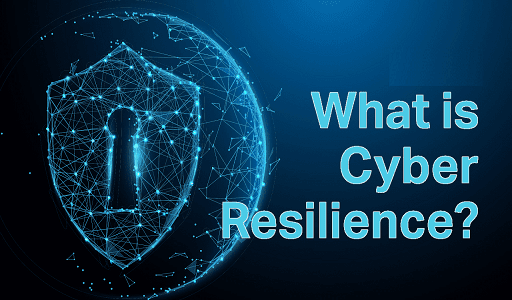Cyber Resilience: Cybercriminals are becoming more brazen by the day and conducting an increasingly diverse range of assaults. The fact that cyberattacks are a part of our everyday lives is demonstrated by the fact that, in contrast to the past, when they operated in the public domain rather than the dark web, they operate in the public domain these days.
The message is unmistakable: If you do not increase your level of protection, you will be forced to deal with the repercussions. Having cyber resilience enables you to better protect your digital assets by providing a more robust security infrastructure. You will gain a deeper understanding of cyber resilience, including how it operates and the many advantages associated with practicing it.

What is Cyber Resilience?
Cyber resilience is the ability to not only protect your system from threats or attacks but also to ensure that it continues to function normally in spite of any dangers or assaults. It acknowledges the danger of cyberattacks while emphasizing the importance of constructing robust security defenses. However, rather than cowering in terror or shutting down your activities, it encourages you to stand up for yourself and carry on with your business as usual.
Cyber resilience is becoming increasingly important in today’s highly dynamic online environment. There is no sign that hackers are going to give up any time soon. In point of fact, they are expanding their skill set in order to improve the effectiveness of their hacking methods. If you do not take the necessary precautions to protect your system, you will be handing it over to them on a silver platter. If you want to give attackers a run for their money, you need to beef up your protection while they are working to improve their own skills.
How do Cyber Resilience and Cybersecurity differ from each other?
People frequently use the terms “cyber resiliency” and “cybersecurity” interchangeably, giving the impression that they are synonymous with one another. Both of these ideas have the objective of assuring the safety, but their methods of accomplishing this are rather distinct from one another.
Cybersecurity places an emphasis on the measures you take to protect your system from being breached by malicious cyber actors. As a preventative approach, it places an emphasis on the actions that can be taken before an assault takes place. Cyber resilience, on the other hand, refers to the capacity to withstand and endure cyberattacks. Establishing a framework that can guide one through the entirety of an attack’s lifespan is required. The term “cyber resiliency” refers to an expanded aspect of “cybersecurity.”
How does Cyber Resilient work?
Cyberattacks are massive. Attackers always seem to be one step ahead of you, coming up with new strategies just when you think you have the best method worked out to protect your system. In light of this, the concept of cyber resilience proposes that there is no one surefire method for protecting your digital assets. It necessitates the implementation of a unified security strategy that incorporates various layers.
It is necessary to develop robust defensive and recovery measures in order to put into practice good cyber resilience. Your data should be your top priority when it comes to preventing illegal access. At this point, you investigate several security measures, like attack surface management, endpoint security, and access control, amongst others.
Cyber resilience improves the level of security you have by investigating different methods of minimizing the effects of cyberattacks on your business so that they do not cause a disruption. In this part of the incident response plan, you are going to evaluate a variety of different choices, including data recovery and backup.
A heightened awareness of the need for security is essential to maintaining one’s cyber resilience. It is imperative that you are aware of what to do both before and after an assault.
The following procedures must be carried out by a strong cyber resilience structure.
- Determine the risks, vulnerabilities, and dangers that are associated with cyberspace.
- Protect your system and the digital assets it contains by putting in place various security measures.
- Maintain a close watch on your security architecture so that you can locate any weaknesses.
- Follow the strategies that you have defined in your incident response strategy in order to effectively respond to cyber threats and assaults.
- Start working on a recovery plan as soon as possible to reduce the damage that can be done by an attack on your network.
- Maintain a close eye on your operations in order to achieve ongoing progress.
What are the benefits of Cyber Resilience?
Fear of an attack is not something that can be entertained by cyber resilience. Instead, it should motivate you to construct a reliable security infrastructure that you can use to fight back against threats. The following advantages will become available to you after you have the hang of it.
-
Be mindful of your personal privacy
Data assets are typically the primary targets of hackers and other online criminals. They are aware that once they obtain access to your private information, you would comply with whatever demands they make because you are afraid of having sensitive information made public.
Cooperating with hackers during ransomware discussions is vital, but doing so does not guarantee that they will return your data, nor does it guarantee that they will not disclose it to others. There have been instances where hackers have disclosed the data of victims even after the victims had completed the tasks that the hackers had requested.
Your privacy is protected by cyber resilience because it strengthens the protective walls surrounding your digital assets. You have the option to prioritize your data, making it twice as difficult for hackers to access the data you deem most sensitive.
-
Minimize Downtime
Your operations are disrupted as a result of a well-planned cyberattack, and your system is either rendered unreachable or forced to shut down. Whatever tasks you need to complete will have to be put on hold because the attackers are using this as a method of holding you hostage. It’s possible that you’ll incur financial losses as a result of the process, depending on the structure of your system. Hackers want you to experience this precisely so that they can get what they want from you, and they are delighted to prolong the downtime as long as it takes until they succeed.
Because you have the infrastructure to bounce back almost immediately, cyber resilience enables you to prevent downtime altogether, or at the very least, decrease it to the smallest possible amount. It is possible that external observers will not even notice any disturbance to your operations if you have a robust and prompt incident response plan.
-
Enhance Compliance and Loyalty
If you have the information of your users stored on your system, then a data breach will cause those users’ information to become public, which will ultimately cause them to lose faith in you. Your good name will be ruined, and you will be exposed to the risk of legal action because you failed to comply with the privacy requirements that were in place.
On a more upbeat note, if you are successful in protecting your system against intrusions and assaults, you will see a steady increase in the amount of trust and loyalty from your user base.
-
Lengthen the Recovery Time
If a victim of a cyberattack sustains a significant amount of damage, it may take them several weeks or even months to recover and restore their system to its pre-attack state so that it can perform normally again. Unfortunately, there are some people who never get back to normal after being attacked.
Cyber resilience reduces losses and shortens the amount of time it takes to recover. Because you now have a list of activities that can be taken, you can immediately begin the process of healing by putting those steps into action as quickly as you possibly can.
Protecting your digital assets through the implementation of Cyber Resilience
Attackers take advantage of gaps in security measures. And they continue to be successful, raking in billions of dollars thanks to the ignorance, negligence, and reluctance of internet users to make prioritizing their security a priority for themselves.
Because hackers are determined to steal your digital assets, protecting your system is the very least you can do in response to this threat. In preparation for the time when you’ll need it, stockpile your security supplies as soon as possible. You will be prepared to fight back and defend your digital territory if you are attacked by malicious actors.
Would you like to read more about Cyber Resilience-related articles? If so, we invite you to take a look at our other tech topics before you leave!
![]()













